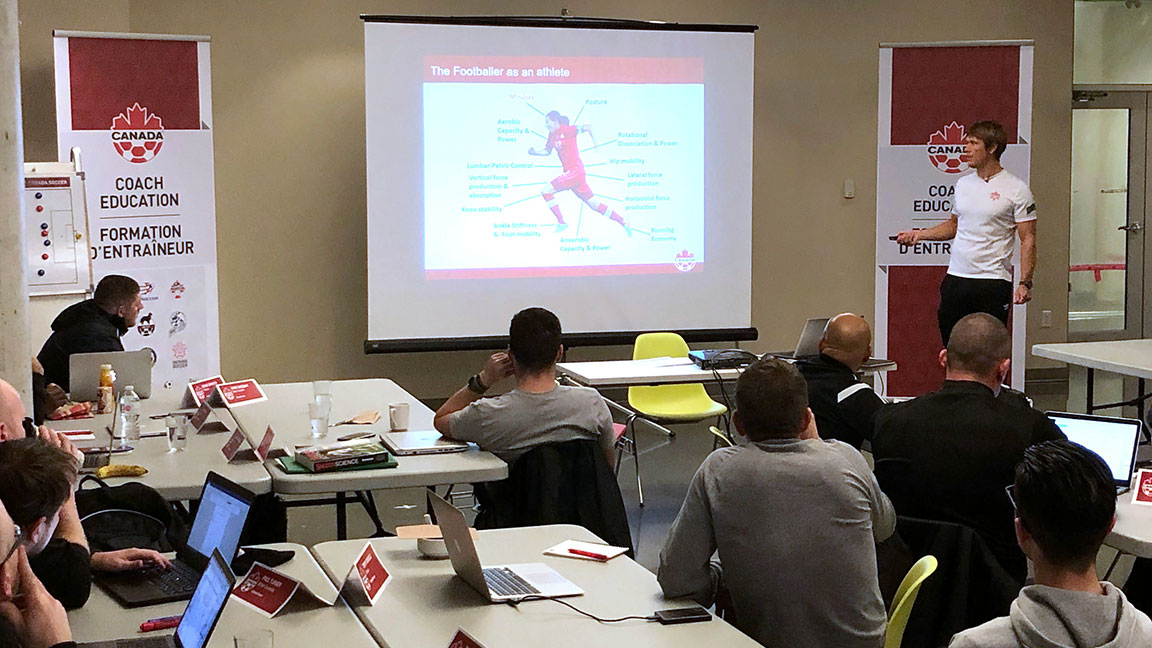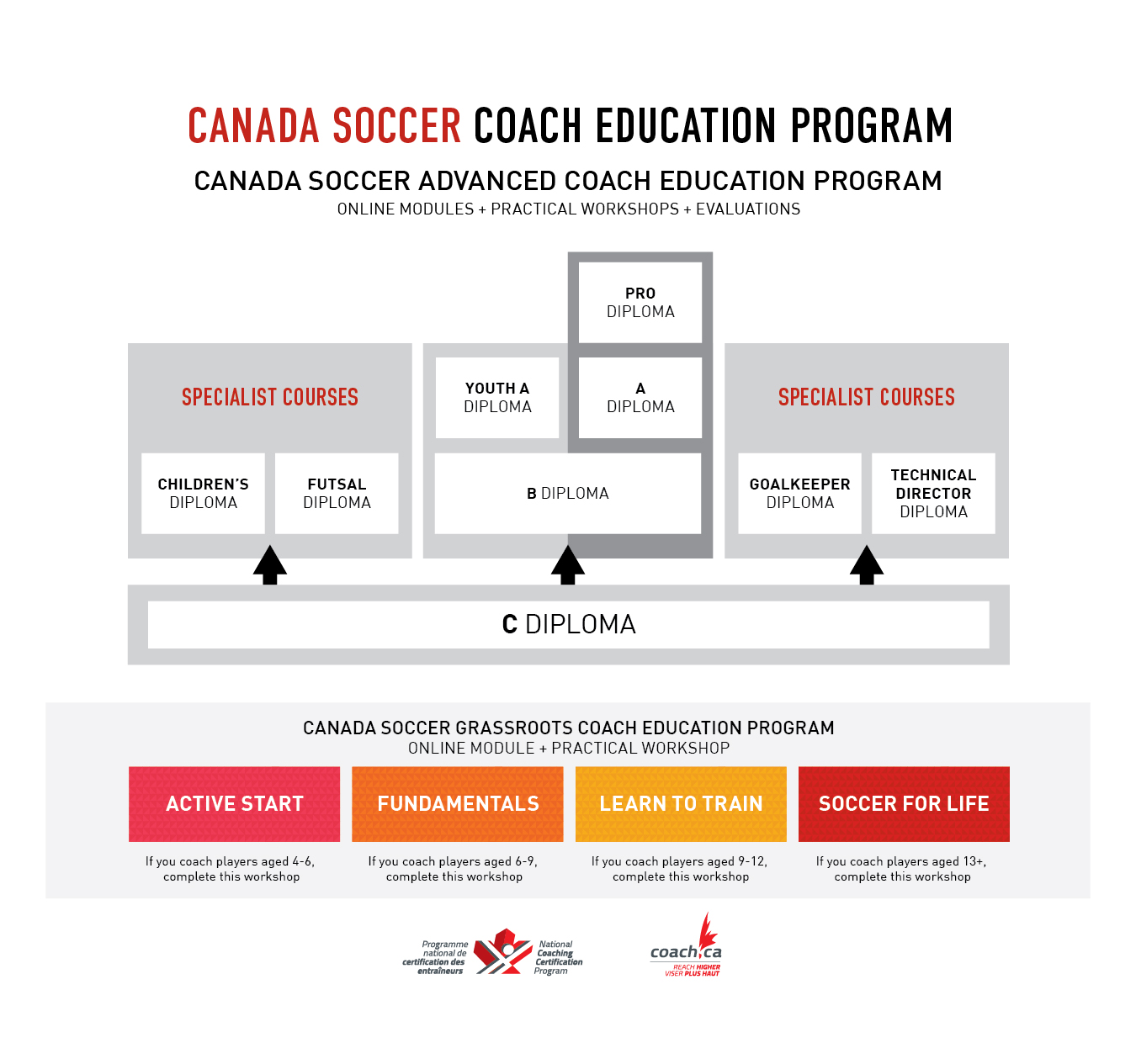
Canada Soccer
Canada Soccer’s Coaching Department was tasked with a significant task when the COVID-19 pandemic hit, but it was also a task that presented an opportunity. The series of lockdowns was a critical hit for Canada Soccer’s Coaching Education, whose curriculum had traditionally required in-person learning.
After heavily considering digitalizing Coaching Education modules prior to the COVID-19 lockdowns, Canada Soccer’s Coach Education branch adapted its curriculum to fit an online environment. The department is now accepting applications for the 2023 coaching season.
“We wanted to give coaches an opportunity to connect to coach education and develop themselves, especially since they had a lot more time on their hands,” said Jim Loughlin, Canada Soccer’s Manager of Coach Education. “As a challenge, we had to take content that was delivered in-person and put it into an online space.”
Coaching Education works to improve the soccer environment across the nation. It is a support system for anyone involved with coaching soccer, from volunteers to professionals. Coaches receive courses and resources that transmit positive attitudes on the pitch.
“We work with coaches to help them have a better understanding of their current coaching context and help them manage all the pieces on the field and off the field,” said Loughlin.
While it is not mandatory to take Coach Education courses to coach in Canada, nearly all leagues and clubs require coaches to have obtained a certain level of training—a standard that Canada Soccer’s Coaching Education provides.
Rob Csabai, Manager of Coaching Development at BC Soccer and a master coach developer with Canada Soccer, had experimented with blended learning for coaching education years before the global pandemic.
He said online learning would make coaching more accessible and that the pandemic “forced us into the online world.”
“We had started talking about taking a blended learning approach to the delivery of coach education,” said Loughlin. “The primary driver was that the majority of coaches in Canada, in the sport of soccer, are volunteers.”
Loughlin added that the majority of the soccer coaching that happens in Canada takes place far from the professional level, indicating that proper coaching training for volunteers is crucial.
In 2019, Canada Soccer’s Safe Sport Roster came into effect, a program designed to set up stage-specific coach education with the relevant level a person is coaching. It also contains programs, policies, and procedures designed to ensure that all organisations that offer soccer programming in Canada create safe, fun, and welcoming experiences for all participants.
“Coaches will take various types of safety training to ensure that coaches can create positive psychological-, social- and emotionally-safe learning environments in practice, in games, when the players travel to competitions, and other team spaces,” said Loughlin.
With the previous programming before online learning was made available, there was a massive time commitment, travel distance and financial burden that some coaches had to carry to ensure they could attend classes. The new blended learning approach with online courses, however, makes the Coaching Education program more accessible to more coaches.

Loughlin noted that quick adjustments were made to launch a preliminary online model for coaches to learn during the pandemic. He added that the first online model was put together in roughly three weeks and it addressed the needs of grassroots coaches at that time.
Csabai played a major role in transitioning the in-person content online at the start of the pandemic. He said that it’s not the only way of learning, but it does allow for accessibility.
“Adult learning has its advantages when it is self directed,” said Csabai. “What E-learning does is provide an opportunity for coaches to be responsible for their learning.”
The further overhaul of the online model, what he called phase two, featured an updated design fit for an online environment at grassroots and advanced coaching levels. The updated version, released in 2021, featured shorter module lengths and also included updates to theoretical and practical content.
BC Soccer was one of the first provinces to put forth a mandate that required all coaches, volunteers or professionals, coaching youths to have the appropriate grassroots training. Csabai said the shortened and readily available online course helps BC coaches a lot.
“It’s logical and it makes sense,” said Csabai. “The online platform makes it easy and palatable for volunteer coaches to … access content that is really going to help them.”
At the Grassroots level, all the theoretical components are asynchronous and all practical components are synchronous. The advanced coach education program is divided into four components: asynchronous, synchronous, in-person classroom learning and in-person learning is done on the pitch.
Matt Ferreira, Manager, Coach Education, Player Development & Club Licensing with Ontario Soccer, said that Canada Soccer has done well to shift philosophically and become a “learner-centric” model, one that supports and empowers coaches
“That has been paramount,” said Ferreira. “They really try and work with individuals within the framework of the course and [let coaches] get a feel for who they are.”
Coaching Education values individuals’ experiences, feedback and self-reflection—a bottom-up approach that makes the courses more desirable. Ferreira cited a past negative coaching experience when he entered coaching, where he was told that his coaching style wasn’t suited for Canada. He said any situation like that would be impossible to happen today.
Csabai encourages everyone to value the importance of coaching excellence and education. He believes that if everyone buys into the vision of coaching excellence then we’ll have the positive environment we’re looking for.
“If we don’t create a good environment for [everyone], then they’re not going to come back,” said Csabai. “These resources are key for creating a safe, fun and challenging environment.” Registration for the 2023 Advanced Coach Education Program is available for registration until 30 November.
Story by Jayden Dill